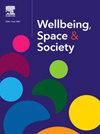Mobilising knowledge with nurses practicing during the Covid-19 pandemic: Prioritising strategies for enhancing nurses’ psychological wellbeing in the workplace
IF 2.2
Q2 GEOGRAPHY
引用次数: 0
Abstract
The Covid-19 pandemic exacerbated pressures on an already strained nursing workforce, heightening poor psychological and emotional wellbeing. A two-year qualitative longitudinal study with nurses (n = 50) examined these impacts. Following study completion, efforts focused on mobilising knowledge through the development strategies (outputs) to better support nurses’ psychological wellbeing during future pandemics and inform healthcare policy (outcome) that over time, could potentially lead to real-world impact from our research.
In healthcare, demonstrating research impact is important yet complex. Knowledge mobilisation activities are crucial for developing impact pathways by collaborating with key stakeholders to share knowledges and find solutions to workplace challenges. This paper documents the early stages of our impact journey, where a subsample of nurses (n = 10) participated in a workshop designed to mobilise knowledge through reflective discussions that would prioritise strategies to enhance nurses’ psychological wellbeing.
The workshop included four knowledge mobilisation activities: a film preview, sharing biographical objects, a world ‘strategy’ café, and a celebratory event. The film resonated with nurses, uniting them through a collective narrative while biographical objects enriched reflective discussions by focussing on personal lived experiences. The world ‘strategy’ café activity was effective in facilitating reflective discussions which prioritised workplace strategies that could inform health care guidance and policy. The celebratory event allowed nurses to reflect on their participation in both the study and the workshop and indicated that knowledge mobilisation activities can demonstrate ‘soft’ impact from the study. When considering research impact, researchers could be more attentive to soft impact as one facet of knowledge mobilisation.
在2019冠状病毒病大流行期间与执业护士一起调动知识:优先考虑加强护士工作场所心理健康的战略
2019冠状病毒病大流行加剧了本已紧张的护理人员的压力,加剧了他们糟糕的心理和情绪健康状况。一项为期两年的护士定性纵向研究(n = 50)检验了这些影响。研究完成后,工作重点是通过发展战略(产出)调动知识,以便在未来流行病期间更好地支持护士的心理健康,并告知医疗保健政策(结果),随着时间的推移,这些政策可能会从我们的研究中产生潜在的现实影响。在医疗保健领域,展示研究影响很重要,但也很复杂。通过与主要利益攸关方合作,分享知识并找到应对工作场所挑战的解决方案,知识动员活动对于开发影响途径至关重要。本文记录了我们影响之旅的早期阶段,其中护士子样本(n = 10)参加了一个研讨会,该研讨会旨在通过反思性讨论调动知识,优先考虑提高护士心理健康的战略。研讨会包括四项知识动员活动:电影预览、分享传记物品、世界“战略”咖啡馆和庆祝活动。这部电影引起了护士们的共鸣,通过集体叙事将她们团结在一起,而传记对象通过关注个人生活经历丰富了反思性讨论。世界“战略” caf活动有效地促进了反思性讨论,这些讨论优先考虑了可为保健指导和政策提供信息的工作场所战略。庆祝活动让护士们反思了他们对研究和研讨会的参与,并表明知识动员活动可以展示研究的“软”影响。在考虑研究影响时,研究人员可以更关注软影响作为知识动员的一个方面。
本文章由计算机程序翻译,如有差异,请以英文原文为准。
求助全文
约1分钟内获得全文
求助全文
来源期刊

Wellbeing Space and Society
Social Sciences-Social Sciences (miscellaneous)
CiteScore
2.70
自引率
0.00%
发文量
46
审稿时长
124 days
 求助内容:
求助内容: 应助结果提醒方式:
应助结果提醒方式:


